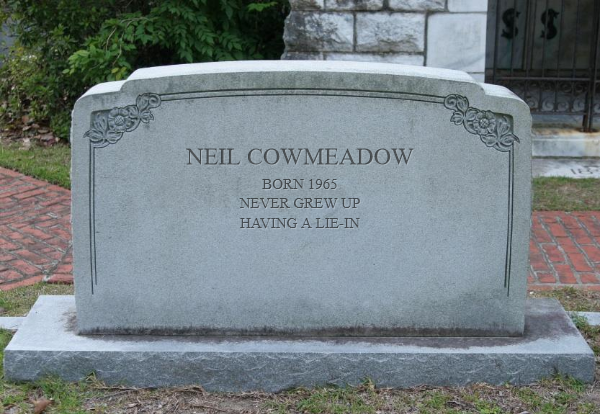|
The Thursday Thesis - 28/11/2019
In the cult TV show Star Trek, Spock - the half-human, half-Vulcan Science officer – coined the phrase “Live long and prosper” as a greeting to fellow Vulcans, accompanying it with a hand gesture dividing his fingers into two pairs with the thumb extended. To me, it’s a great salutation – far better than “Good morning” or the ubiquitous “Hi”. Live Long and Prosper is an affirmation of life and all its potentials: therefore it is deeply cool in my book. But there’s something missing, in my opinion. Living Long and Prospering is all well and good, but how should we die? Personally I’m a fan of being astonishingly active and rudely healthy, deep in to old age – enjoying perfect health right up until the moment when I drop Dead. I want to arrive at my own graveside absolutely spent: exhausted, gulping my last breath as I skid my motorcycle sideways to a halt, tipping me effortlessly into the pit as the lady who I was having sex with dismounts gracefully and pirouettes away, just seconds after our final, tumultuously synchronised orgasms. And as I look up at the sky from six-feet below the grass I smile, murmuring “What a ride – now I’m going to have a lie-in” as the vicar and the gravediggers start shovelling the dirt in – clearly terrorised by the thought that I might change my mind and spring back out of the hole before bounding off in pursuit of more fun and misadventure. Sounds good to me; that was probably how life ended for a good many of our prehistoric forebears – long-term diseases were rare and (if you made it past infancy) life expectancy seems to have been pretty good. Archaeologists tell us that heart disease was virtually unknown and cancer was rare in ancient times – ancient humans seem to have been on the go right up to the end of their lives. The medical establishment tells us that cancer and heart disease are difficult to treat without spending vast amounts of money on drugs: funny how Johnny Caveman had no problem with the modern killer diseases, isn’t it? As we grow older we are expected to sicken, weaken and decline before we die – but aren’t we buying into a dodgy model here? When we accept that growing older must mean a loss of powers, declining strength and virility we accept the notion that we are victims of an irresistible force set out against us: we begin to adopt the habits, movements and lifestyle we have been told is appropriate for us and acceptable to society. So life is good for a short time, just until we reach the tipping point where we cease to consider ourselves young and unlimited, transitioning into passive riders on the long, slow downhill path to a medicated dotage and ultimate release... It doesn’t have to be this way. There is a mountain of research demonstrating that most of today’s major diseases are caused by the dismal diet (built on false premises and the suspect recommendations of Governments) we are peddled by big Corporations, compounded by our lack of movement. What the research suggests is that changing one’s diet and walking around could just about transform your life and the lives of entire nations. But you probably won’t hear about all that research, because it’s been kept out of the mainstream media by people with too much to lose if we ever find out the truth about the Western Pattern Diet (also known as the Standard American Diet – poetically abbreviated to SAD) and how its ideas poisoned the World. Since much of the Western World began to adopt the SAD and looked to the nutritional guidelines of the US’s Food Pyramid (low fat, high carbohydrates, low salt etc) diseases and chronic illness have mushroomed. In countries all over the World obesity and type 2 diabetes (formerly called Adult-Onset Diabetes) have tracked politely behind the introduction of SAD. It’s not a coincidence – it’s causation, not correlation. In every Country where the SAD has gained a hold, the story is the same: rising levels of disease and obesity, with long-term sickness occurring earlier in life, necessitating vast spending on medication to manage the problems caused by the SAD. And as UK’s the population ages, more and more of us will become sick, medicated, and helpless; reliant on drugs and healthcare to manage our symptoms – just like America - and every other country infected by the SAD. We owe it to ourselves to be vigilant and to be difficult: to question the advice given to us about our food by the food industry, about our healthcare by the people who sell us drugs, and by a society whose “average” citizen is fat, sick and medicated. That’s not how I’m planning to live out the next fifty or so years: I’m going to Live Long and Drop Dead - how about you? © Neil Cowmeadow 2019 Please Like and Share The Thursday Thesis with your friends, family, and your chosen deity. I’d love to hear your comments, along with any ideas you’d care to hurl at me. [email protected]
0 Comments
Episode 178 - White Belt Mind
The Thursday Thesis - 21/11/2019 It is said that when one begins the journey into Buddhism the hardest thing to do is to clear one’s mind: to achieve Shoshin – the so-called Beginner’s Mind. Shoshin is an empty mind; no preconceptions and open to anything when studying a subject. And it is a mind without place-markers for meaning or a frame of reference the initiate can easily feel lost and disoriented. In meditation we should try to simply be: to quiet the seemingly incessant chatter of our “Monkey Mind” which is our usual waking state – unsettled, restless, capricious, whimsical, fanciful and inconstant; confused, indecisive and almost completely uncontrollable. Monkey Mind's thoughts rise up inside us, capture and fixate our attention, then fade into darkness like fireworks in the night. The aim is to simply empty one’s mind and notice what comes and goes, without reacting or judging, usually by paying attention to one’s breath and the flow of air into and out of the body; to observe our Monkey Mind thoughts rise, subside and fade, only to be replaced by more thoughts, which – in turn – also pass and are replaced, endlessly and continuously. All that Monkey Mind sounds pretty tiring to me. In Beginner’s Mind we accept that we know nothing – because we are beginners (the clue is in the name). When newcomers to the guitar come for their first lesson the biggest problem is that they already know that learning to play guitar will be difficult, that they have no talent, no rhythm, that there are no musicians in their family, etc, etc, etc. Their Monkey Mind has been yapping away for years – often decades – based on knowing bugger-all about playing guitar! Yep, based on no knowledge of the instrument they (we, really – because I used to “know” how hard it was to play guitar, too) have convinced themselves of a whole bunch of unhelpful things, so the very first (and most important) thing in the lesson will be the systematic elimination of those beliefs – to engender their Beginner’s Mind and to clear away their unfounded certainty. Subduing Monkey Mind takes time and... And what? Not effort, but attention. Once you become aware of Monkey Mind and simply notice its prattle, you can let it talk and talk – allow it to rage and rail, worry and fret – notice that thoughts rise and subside, endlessly forming and drifting away. You come to realise that most of it is just nonsense and, over time, become less attached to your thoughts and reactions: the mind clears and empties itself. We can come to understand that we know nothing and in so doing begin to learn the first lesson. The lesson is that it’s not what you don’t know that hurts you, it’s what you know damned well and that isn’t true that hurts you. Your Monkey Mind dances with untruth, worry and your own fears turned back in on yourself, and by stilling that Monkey chatter you can open up your mind to learning. The first step to learning to play the guitar - or anything else for that matter - is to clear away the untrue, the second is to acquire the true. © Neil Cowmeadow 2019 Please Like and Share The Thursday Thesis with your friends, family, and your chosen deity. I’d love to hear your comments, along with any ideas you’d care to hurl at me. [email protected] |
Share it with your friends
It's Like This...The Thursday Thesis shares ideas which I think are worth spreading. Archives
May 2022
Categories
All
All content on these pages is the intellectual property of the author, unless otherwise stated, and may not be used in any form or reproduced under any circumstances without the authors permission.
|


 RSS Feed
RSS Feed